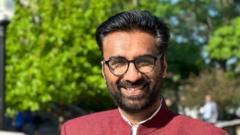Badar Khan Suri, a scholar of conflict studies from India, found himself at the center of a legal storm when he was arrested in the United States on March 17, facing deportation over claims of terror-related links. His journey began 15 years ago when an invitation from a classmate led him to join an international aid convoy to Gaza, a region governed by the Islamist group Hamas and often in conflict with Israel.
On that memorable summer evening in Delhi, Suri was approached by peers about the chance to participate in a humanitarian mission to one of the world's most volatile areas. The caravan, composed of over 150 activists from various Asian nations, was deemed a unique opportunity for students of conflict studies. Eager to experience the situation firsthand, Suri accepted the offer, eventually meeting and marrying Mapheze Saleh, a Palestinian whose father was a former adviser to Hamas.
After settling in the US, where he began his postdoctoral fellowship at Georgetown University, Suri's life took an unsettling turn. Following a crackdown on pro-Palestinian activists, he was arrested under allegations of maintaining close ties to a known Hamas adviser, as confirmed by Tricia McLaughlin, the assistant secretary of the Department of Homeland Security. Suri firmly denies any wrongdoing. This incident reflects the broader political climate as former President Donald Trump’s administration intensified scrutiny on immigration and activism connected to the Palestinian rights movement.
Despite the legal predicament, many who know Suri maintain that the accusations are far-fetched. Friends, classmates, and professors describe him as a dedicated and scholarly individual, committed to humanitarian causes rather than terrorism. They emphasize that expressing views on the Israeli-Palestinian conflict falls within his academic pursuits and does not warrant criminal allegations.
Suri's arrest provoked discomfort among those familiar with his character. His wife, a US citizen and a respected advocate for peace, was also integral to his life story, having worked in Gaza prior to their marriage in 2013. Together, they continued their lives in Delhi until Suri relocated to Virginia earlier this year, just months shy of completing his fellowship.
As the situation unfolds, Suri’s father expressed heartbreak over the accusations against his son, firmly asserting that Suri’s only “sin” is his marriage to a Palestinian woman. The case has drawn attention to the complex intersections of advocacy, security, and immigration policy, raising questions about the impact of political climates on individuals deeply engaged in humanitarian and academic work.


















